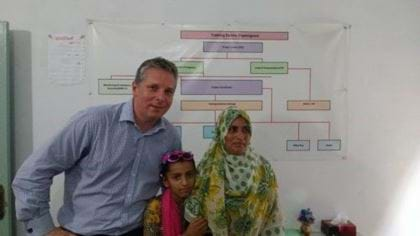Richard Hawkes Visiting our Partners in Pakistan

Living in a joint family system with her husband, three children and in-laws, Irum faced many problems. Right from the beginning, she always felt that she has no decision-making power in her home as her elder sister-in-law made all decisions pertaining to the family’s life. Irum managed the household, her children and was also the sole caretaker for her paralysed mother-in-law; she was reprimanded if her in-laws or husband felt that she was not performing her duties well.
For 25 years Irum quietly lived in an unhappy and emotionally abusive marriage.
She felt controlled and insignificant in her life; her self-esteem had been affected and pent- up anger slowly building inside her. Her breaking point came after her husband’s business got affected due to COVID and he became even more irritable and blamed her for his misfortunes. As their relationship further deteriorated, arguments between both, and her stress increased, severely impacting her mood. She started feeling low and irritable. Having no social support and effective coping mechanisms exacerbated her stress.
Having tested positive with COVID-19, Irum called the British Asian Trust’s partner Interactive Research Development’s (IRD) mental health support helpline and her issues were finally unearthed. She was able to share her concerns with the counsellor in a non-judgmental, cathartic environment.
The counsellor conducted a “Circle of control” activity which helped Irum define the controllable and uncontrollable factors for her distress. Instead of fixating on needing to change the behaviour of those around her, she learnt that she can work upon herself and draw happiness and satisfaction from little acts of self-care. She started regularly exercising, which helped her feel energetic and lifted her mood. Other activities shared by her counsellor coached her on anxiety management and gratitude building. She also learnt about healthy boundary building to avoid toxic situations; arguments with her husband started coming under control; her mood lifted and after years she felt hopeful in life.
Whereas once Irum had felt hopeless and despondent in life, she now said:
‘This project has saved me. I’ve learnt how to adjust my perspective on life and become a more positive person. I feel stronger, I can now accept my situation and deal with it in helpful manner so I can still enjoy life, rather than just giving up on life.’

With the support of partners such as CareTech Charitable Foundation and the work of local partner organisations, like IRD, the British Asian Trust is determined to raise awareness and provide vital community mental health services to help more people in Pakistan.
Name has been changed.
Irum not included in photo.
